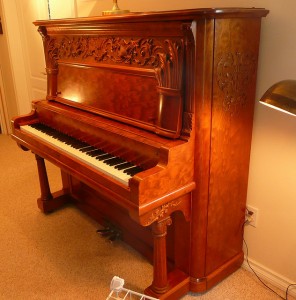I hope you had a wonderful Memorial Day and wonderful Memorial Day weekend. My deepest gratitude goes out to all the men and women who have lost their lives serving our country. Thank you from the bottom of my heart!
As for today’s topic, it’s something that we get asked a lot at Winterhalter Music. Many of our families need advice on instrument selection. In the case of piano lessons, is it ok to start lessons on a keyboard? (See the link plus this one for more info on that and how to select a keyboard to use). Beyond that, at what point after you’ve been playing on a keyboard or digital piano for awhile, should you switch over to an actual piano– upright or grand?
In my case, I had a smaller keyboard with fewer (full size) keys for my first six months of lessons. For the next three and a half years, I played on a full size (including pedals) digital piano. Four years into lessons, I got a Yamaha upright piano. Quite honestly, I would have benefitted from a real piano much much sooner. However, I can understand why my parents didn’t want to fork over a couple thousand dollars right off the bat when they had no idea whether or not I’d enjoy taking lessons.
In general, I think a keyboard or digital piano can work just fine for students for the first 2-5 years of lessons. Certain factors affect exactly when it’s appropriate to make the switch. These factors include:
- Student’s Age
If a student is quite young when they begin lessons, a keyboard will last them much longer. Younger students generally learn and grasp concepts much more slowly. Because it takes longer to get to more complicated music and concepts, a keyboard will suffice for a lot longer.
- Level of Seriousness/ Commitment
The more serious a student is about their piano lessons and the more they practice, the sooner they will need an actual piano. When students get into more than just playing the notes on the page– musicality work, a keyboard won’t cut it.
As far as the benefits to having an actual piano over a keyboard, they are as follows:
- All 88 keys
Pianos have the full 88 keys. Some keyboards do have the full range, while others are shortened (76 or even 61 keys only). Having the full range of notes is important. If a piece has really high or low notes modifications need to be made if a student plays on a smaller range keyboard. More advanced pieces explore the full range of the instrument.
- Pedals
Not all keyboards have pedals. Learning how to use the pedals is an integral part of playing the piano. Not having the pedals can really hold a student back. As a caveat, when a student is young and not tall enough to reach the pedals, it’s perfectly fine not to have them.
- Dynamic Contrast
Honestly, most keyboards lack the technology to have much dynamic contrast without changing the volume knob. Once a student plays pieces that require lots of dynamic contract including crescendos and decrescendos, it just doesn’t work to stop and adjust the volume on the knob multiple times during the piece.
- Weighted Keys
I always recommend that students who have a keyboard play one with weighted keys. While this helps simulate the feel of a piano, I’ve never met a keyboard or digital piano that can match up to feel of a real piano. Having less weight to the keys builds less finger strength. It also can make for a hard transition at recitals when the recital piano keys feel much heavier.
- Tone
Real pianos sound better. They do go out of tune and need occasional touch-ups beyond that. If it’s a quality instrument that’s well maintained, it will sound better than its electric counterpart.
If you are in doubt, talk to your teacher. He or she will happily let you know when they think it would be beneficial to upgrade to a piano. In my case, once I switched to a more advanced teacher and practiced tons everyday, she made it quite clear to my parents that I needed to have a piano if I was going to really improve in the way that I wanted to.
Now I want to hear from you. Teachers, when do you think your students should switch to a piano? Parents, did you have a keyboard and switch to a piano? If so, what benefits did you observe in your child? Leave a comment below. Please subscribe to the newsletter, “like us” on Facebook, and share this with your friends.
Have an enjoyable day!
Sincerely,
Cassie

{ 4 comments… read them below or add one }
I know exactly what you are talking about. However…I don’t have the room for a small grand. So…I have settled for a good digital piano. It works fine for me…I only miss the quality of sound that a grand piano has. Thanks for the messages.
Hey Dean,
Thanks for your comment! Space is also a factor when deciding whether or not to get an actual piano. I’m glad you’re enjoying your digital piano!
Great blog. Thanks for sharing!
Do you know if the Roland fp 90 has the same GM2 tone list?